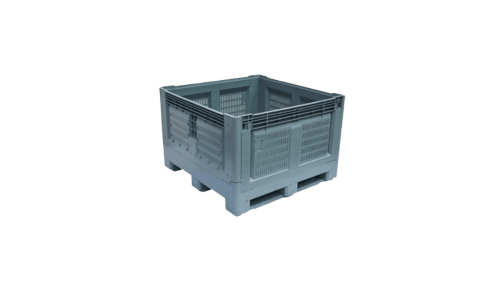Shipping pallets have been around for long time, but – according to Rick LeBlanc and Stewart Richardson, who co-authored ‘Pallets: A North American Perspective’ – their exact origin is hard to pin down. These authors believe that an early type of pallet was first utilised during the mid-18th Century in the stacking of barrels in a warehouse in Louisbourg, Nova Scotia, according to an investigative feature by Cabinet Magazine.
The tale of the pallet really begins to take shape in the 20th century, as Jacob Hodes notes in his investigation of the wooden pallet industry, ‘Whitewood under Siege’, when the skips – a kind of proto-pallet – were collected and stacked with early forklifts in factories. Around 1925, a pallet was designed that most widely resembles the ones we know and use most frequently today.
A unitised world
In a recent article by Slate on how the pallet is the “Single Most Important Object in the Global Economy”, Mark White – a professor at Virginia Tech and director of the William H. Sardo Jr. Pallet & Container Research Laboratory and the Centre for Packaging and Unit Load Design – noted that “Pallets move the world,”.
This may seem like a bold statement, but pallet design and implementation really was a turning point in the development of our globalised world. According to Jacob Hodes ‘ investigation, World War II was the point in time at which pallets has their largest and most pronounced adoption.


Pallet production and usage boomed after the war – along with many other areas of economic expansion and consumer culture – according to Jacob Hodes.
When the US army left behind materials at their military bases in Australia, the pallets were incorporated into the existing logistics infrastructure to form a partially ready-made closed-loop system, according to a paper by the University of Sydney.
Pallets today
New developments in pallet technology have meant that the move from wooden to plastic has improved hygiene standards, and many plastic pallets have a potential life span of 10 years. Plastic pallets are impermeable to alkalis, moisture and weak acids, making them a safer option for transporting or sitting within hygienic areas.
Plastic pallets are also saving companies time when it comes to cleaning, as the plastic makes the surface easier to wipe down, and the pallets don’t need as much cleaning, as there are none of the mould or dust contamination issues of wooden pallets.
For more information on how EcoPallets can help your company to ship and move your products around the world to the highest of standards, don’t hesitate to get in touch today.










Comments are closed.